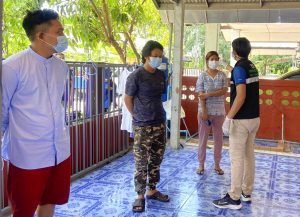Three reporters from the Democratic Voice of Burma (DVB) have been arrested in Thailand, after fleeing the military junta’s accelerating crackdown on the press in Myanmar.
According to an “emergency statement” from Aye Chan Naing, DVB’s executive director and chief editor, the three journalists were arrested Sunday in Chiang Mai along with two activists during a random search by police. They have been charged with entering Thailand illegally.
The news organization is urging Thailand not to deport them, “as their life will be in serious danger if they were to return.” The statement also appealed for the U.N. refugee agency to intervene to guarantee the journalists’ safety.
According to DVB, the three reporters were covering demonstrations in Myanmar until March 8, when the military junta revoked DVB’s media license and banned it from reporting in the country. The Associated Press reported that the journalists may have continued to report from a single-story house in which they seemed to have set up a makeshift video production studio.
Myanmar’s junta, which seized power on February 1 and ousted the elected government of Aung San Suu Kyi, has since waged a war on the country’s media. Since the coup, the junta has arrested an estimated 73 journalists and media workers, terminating at a stroke the flourishing media environment fostered by the limited political reforms of the past decade. About 40 remain in detention, according to the Committee to Protect Journalists, including at least two who work for DVB.
In addition to DVB, the junta has revoked the operating licenses of four other privately run news outlets: Mizzima, Myanmar Now, 7Day News, and Khit Thit Media. Last week, the junta also banned the ownership of satellite dishes, in part to prevent independent satellite broadcasts, including by DVB, from reaching the population.
DVB’s claim that the journalists’ lives could be at stake if they are forcibly returned to Myanmar is far from an exaggeration. On Sunday, the family of the arrested Myanmar poet Khet Thi, who had issued calls for the Myanmar people to stand up and resist the junta’s rule, reported that he died in custody overnight. They said that his body was returned with the organs removed, indicated that he was tortured during his detention.
As the Foreign Correspondents Club of Thailand said in a statement today, “These five individuals would face certain arrest and persecution, if not worse, for their work and association with the DVB, and under no circumstances should they be deported back to Myanmar.”
The coup in Myanmar has been accompanied by the reactivation of exile networks established during the last period of direct military rule, many of them based in Thailand, which shares a long land border with Myanmar. Under the old military junta, DVB operated a bureau-in-exile in Chiang Mai, before opening a bureau inside the country after the political reforms that began in earnest in 2011.
The arrests of the three journalists poses an important test for the government of Prime Minister Prayut Chan-o-cha. On the one hand, of Myanmar’s immediate neighbors, Thailand stands to lose perhaps the most from the instability that has followed the military coup. For years, the country has experienced a steady backwash from the country’s civil wars, and refugee camps continue to line the two countries’ shared border.
In the event of a complete breakdown of the central state in Myanmar, Thailand would likely experience floods of refugees across its borders. This carries an additional threat in the age of COVID-19, given the collapse of virtually all testing and vaccination efforts in Myanmar since the coup. If there is any country that would wish to see an end to Myanmar’s post-coup crisis, it should be Thailand.
At the same time, perhaps mindful of his own coup-assisted ascent to power, Prayut has so far studiously avoided saying or doing anything that might be construed as a criticism of Myanmar’s military government. Shortly after the coup, Tatmadaw chief Sen. Gen. Min Aung Hlaing wrote to Prayut asking his help to “support democracy” in Myanmar. The Thai leader also decided not to attend ASEAN’s special meeting on the Myanmar crisis last month.
Despite popular narratives that posit the Thais and Burmese as “traditional enemies,” the two countries’ militaries have long enjoyed close relations. Min Aung Hlaing considers himself an adopted son of the late Gen. Prem Tinsulanonda, a former Thai prime minister and president of the Privy Council which advises the country’s powerful monarchy.
In the past, Thailand was sometimes willing to turn a blind eye to the Myanmar exiles working and organizing from its soil, and over the years offered asylum to many. Whether such tolerance is extended to the DVB journalists and activists arrested this weekend remains to be seen.
Today, the Thai Ministry of Foreign Affairs said that the government was “working” on the case. “Thai authorities concerned are coordinating to find possible humanitarian solutions to this case,” Tanee Sangrat, the ministry’s spokesperson, told the Thai Enquirer.
Either way, whatever the Thai government eventually decides to do will give the outside world a clear signal of its priorities.

































